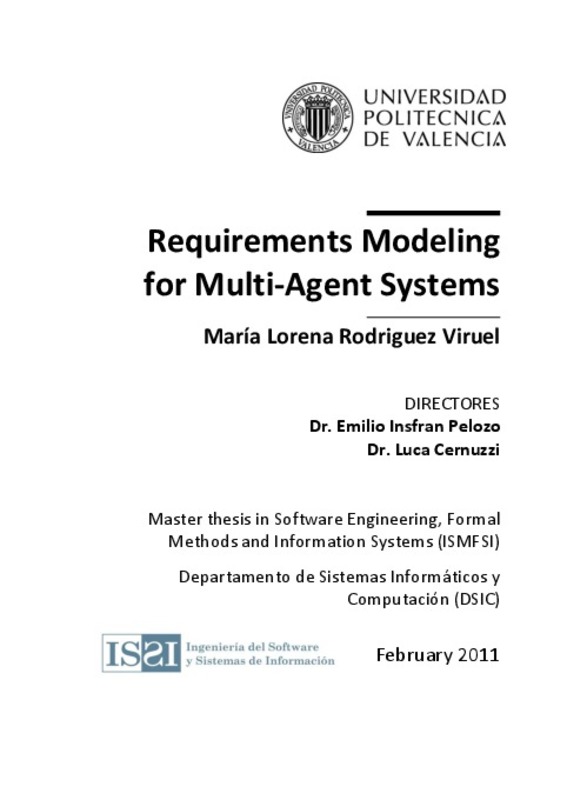JavaScript is disabled for your browser. Some features of this site may not work without it.
Buscar en RiuNet
Listar
Mi cuenta
Estadísticas
Ayuda RiuNet
Admin. UPV
Requirements Modeling for Multi-Agent Systems
Mostrar el registro sencillo del ítem
Ficheros en el ítem
| dc.contributor.advisor | Insfrán Pelozo, César Emilio
|
es_ES |
| dc.contributor.advisor | Cernuzzi, Luca
|
es_ES |
| dc.contributor.author | Rodríguez Viruel, María Lorena
|
es_ES |
| dc.date.accessioned | 2011-09-01T07:18:08Z | |
| dc.date.available | 2011-09-01T07:18:08Z | |
| dc.date.created | 2011 | |
| dc.date.issued | 2011-09-01 | |
| dc.identifier.uri | http://hdl.handle.net/10251/11416 | |
| dc.description.abstract | Different approaches for building modern software systems in complex and open environments have been proposed in the last few years. Some efforts try to take advantage of the agent-oriented paradigm to model/engineer complex information systems in terms of independent agents. These agents may collaborate in a computational organization (Multi-Agent Systems, MAS) by playing some specific roles having to interact with others in order to reach a global or individual goal. In addition, due to the complex nature of this type of systems, dealing with the classical functional and structural perspectives of software systems are not enough. The organizational perspective, that describes the context where these agents need to collaborate, and the social behavior perspective, that describes the different "intelligent" manners in which these agents can collaborate, need to be identified and properly specified. Several methodologies have been proposed to drive the development of MAS (e.g., Ingenias, Gaia, Tropos) although most of them mainly focus on the design and implementation phases and do not provide adequate mechanisms for capturing, defining, and specifying software requirements. Poor requirements engineering is recognized as the root of most errors in current software development projects, and as a means for improving the quality of current practices in the development of MAS, the main objective of this work is to propose a requirements modeling process to deal with software requirements covering the functional, structural, organizational, and social behavior perspectives of MAS. The requirements modeling proposed is developed within the model-driven engineering context defining the corresponding metamodel and its graphical syntax. In addition, a MAS requirements modeling process is specified using the Object Management Group's (OMG) Software Process Engineering Metamodel (SPEM). Finally, in order to illustrate the feasibility of our approach, we specified the software requirements of a strategic board game (the Diplomacy game). | es_ES |
| dc.format.extent | 121 | es_ES |
| dc.language | Inglés | es_ES |
| dc.publisher | Universitat Politècnica de València | es_ES |
| dc.rights | Reserva de todos los derechos | es_ES |
| dc.subject | Multi-agent systems | es_ES |
| dc.subject | Requirements engineering | es_ES |
| dc.subject | Model driven software development | es_ES |
| dc.subject | Social behavior | es_ES |
| dc.subject | Game domain | es_ES |
| dc.subject | Sistemas multi-agente | es_ES |
| dc.subject | Ingeniería de requisitos | es_ES |
| dc.subject | Desarrollo de software dirigido por modelos | es_ES |
| dc.subject | Comportamiento social | es_ES |
| dc.subject | Dominio de juego | es_ES |
| dc.subject.classification | LENGUAJES Y SISTEMAS INFORMATICOS | es_ES |
| dc.subject.other | Máster Universitario en Ingeniería del Software, Métodos Formales y Sistemas de Información-Màster Universitari en Enginyeria del Programari, Mètodes Formals i Sistemes D'Informació | es_ES |
| dc.title | Requirements Modeling for Multi-Agent Systems | es_ES |
| dc.type | Tesis de máster | es_ES |
| dc.rights.accessRights | Abierto | es_ES |
| dc.contributor.affiliation | Universitat Politècnica de València. Servicio de Alumnado - Servei d'Alumnat | es_ES |
| dc.description.bibliographicCitation | Rodríguez Viruel, ML. (2011). Requirements Modeling for Multi-Agent Systems. http://hdl.handle.net/10251/11416 | es_ES |
| dc.description.accrualMethod | Archivo delegado | es_ES |






